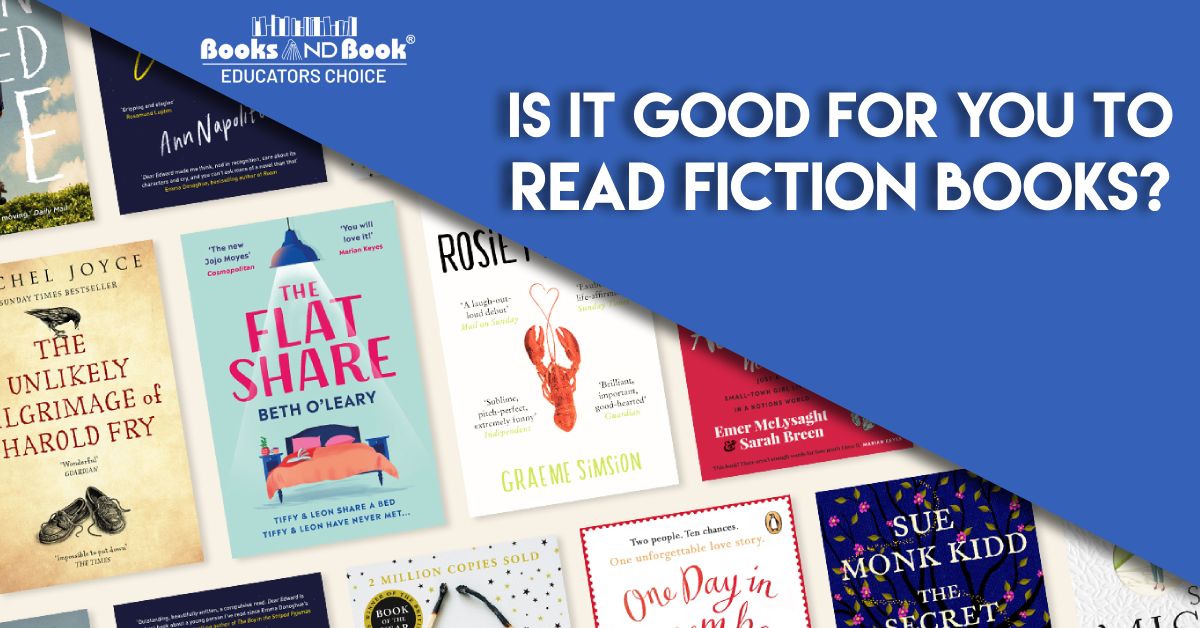Reading fiction books has long been regarded as a pleasurable pastime, but its benefits extend far beyond mere entertainment. Research and studies have shown that delving into the world of fiction can have profound effects on various aspects of our lives, including cognitive, emotional, and social well-being.
Let’s discover “is it good for you to read fiction books?” and explore some of the key reasons why reading fiction is not just enjoyable but also beneficial for individuals of all ages.
Is It Good for You to Read Fiction Books: 7 Benefits
1. Cognitive Development
Numerous studies have demonstrated the cognitive benefits of reading fiction. When we engage with a fictional story, our brains are challenged to visualize characters, settings, and events, which stimulates regions associated with imagination and creativity.
This mental exercise helps strengthen neural pathways and enhances cognitive function, including memory retention, critical thinking, and problem-solving skills. As well, it’s been linked to improved linguistic abilities, vocabulary expansion, and language comprehension, as readers encounter new words and phrases within context.
2. Emotional Intelligence
Reading fiction provides a unique opportunity to explore the complexities of human emotions and relationships. As readers immerse themselves in the lives of fictional characters, they develop a deeper understanding of empathy, compassion, and emotional resilience.
Studies have shown that individuals who regularly read fiction demonstrate higher levels of empathy and are better equipped to recognize and interpret emotional cues in real-life situations. By experiencing a wide range of emotions vicariously through fictional narratives, readers learn to navigate their own feelings and relate more effectively to others, fostering stronger interpersonal connections and social bonds.
3. Psychological Well-being
The escapism offered by fiction can be a powerful tool for reducing stress, anxiety, and depression. Engaging with a captivating story provides a temporary respite from the pressures of daily life, allowing readers to relax and unwind.
Research suggests that reading fiction has therapeutic effects, akin to mindfulness meditation, by promoting relaxation and inducing a state of flow—the immersive experience where one becomes fully absorbed in an activity. Also, they offer a safe space for exploring complex themes and existential questions, which can promote self-reflection, personal growth, and a sense of purpose.
4. Social Connection
Contrary to the stereotype of reading as a solitary activity, fiction can actually foster social connection and community engagement. Shared reading experiences, such as book clubs or online discussions, provide opportunities for individuals to connect with like-minded peers, exchange ideas, and form meaningful relationships.
Moreover, these books can serves as a universal language that transcends cultural and linguistic barriers, enabling readers to connect with diverse perspectives and experiences. Through the shared exploration of fictional worlds, readers develop a sense of belonging and solidarity, strengthening social cohesion and promoting cultural understanding.
5. Stress Reduction and Relaxation
Engaging with fiction has been shown to have a calming effect on the mind and body, making it an effective tool for stress reduction and relaxation. Reading a captivating story transports readers to a different world, where they can temporarily leave behind their worries and anxieties. This mental escape allows for a break from the demands of everyday life, promoting feelings of relaxation and rejuvenation.
Research indicates that just a few minutes of reading fiction can significantly lower stress levels, decrease heart rate, and reduce muscle tension, providing a much-needed reprieve in today’s fast-paced world.
6. Cognitive Empathy and Perspective-taking
Reading fiction not only enhances empathy but also promotes cognitive empathy—the ability to understand another person’s perspective and mental state.
As readers encounter diverse characters and narratives, they are prompted to consider different viewpoints, motivations, and life experiences. This practice of perspective-taking strengthens cognitive empathy, enabling individuals to recognize and appreciate the complexities of human behavior.
By inhabiting the minds of fictional characters, readers develop a broader understanding of the world and the people who inhabit it, fostering tolerance, acceptance, and open-mindedness.
7. Lifelong Learning and Personal Growth
Fictional literature offers a wealth of knowledge, insights, and life lessons that contribute to lifelong learning and personal growth. Through the exploration of diverse genres and themes, readers gain exposure to a wide range of ideas, cultures, and historical periods.
Fictional narratives often incorporate elements of history, philosophy, psychology, and sociology, providing opportunities for intellectual enrichment and self-discovery.
Moreover, the act of reading encourages curiosity, critical thinking, and intellectual curiosity, qualities that are essential for continuous learning and personal development. Books relating to the genre of success help us in building these skills on a deeper level.
Whether it’s uncovering hidden truths, confronting moral dilemmas, or grappling with existential questions, fiction challenges readers to expand their horizons and engage in deeper introspection, fostering a lifelong love of learning and self-improvement.
My Recommended Fiction Books To Read
1. “To Kill a Mockingbird” by Harper Lee
This book is really cool! It’s about a girl named Scout who lives in a small town in the old days. She learns a lot about fairness and kindness when her dad, a lawyer, defends a black man accused of a crime he didn’t do. It’s sad sometimes, but it teaches important stuff about treating people right.
2. “The Night Circus” by Erin Morgenstern
Imagine a magical circus that only comes at night. This book is all about that! It’s full of wonder and mystery, with two magicians competing in a magical contest. It’s like stepping into a dream world with lots of surprises.
3. “Harry Potter and the Sorcerer’s Stone” by J.K. Rowling
You’ve probably heard of Harry Potter, right? It’s about a boy who finds out he’s a wizard and goes to a special school for magic. There are dragons, spells, and cool adventures. It’s super exciting and makes you wish you could go to Hogwarts too!
4. “The Great Gatsby” by F. Scott Fitzgerald
This book is set in the roaring twenties when parties were big and everyone had lots of money. It’s about a guy named Gatsby who throws the best parties but has a secret past. There’s drama, romance, and some sad parts too. It shows that sometimes even rich people have problems.
5. “Pride and Prejudice” by Jane Austen
In this book, there’s a girl named Elizabeth who lives in England a long time ago. She meets a rich guy named Mr. Darcy, but they don’t get along at first. It’s a funny and sweet story about love and how first impressions can be wrong.
6. “The Catcher in the Rye” by J.D. Salinger
This book is about a teenage boy named Holden who’s trying to figure out life. He’s a bit of a rebel and doesn’t like most people. It’s a bit sad but also funny, and you can learn a lot about growing up and finding yourself.
7. “1984” by George Orwell
Imagine living in a world where the government controls everything you do and say. That’s what this book is about. It’s kind of scary but makes you think about freedom and how important it is to speak up for what’s right.
8. “The Alchemist” by Paulo Coelho
This book is like a fairy tale for grown-ups. It’s about a boy named Santiago who goes on an adventure to find treasure but learns about himself along the way. It’s inspiring and teaches you to follow your dreams.
9. “The Hunger Games” by Suzanne Collins
In this book, the world is divided into districts, and every year, they pick kids to fight in a deadly game. It’s intense and exciting, with a brave girl named Katniss who fights for her family and friends. It’s a real page-turner!
10. “The Hobbit” by J.R.R. Tolkien
This is a classic adventure story about a hobbit named Bilbo who goes on a quest with dwarves to find treasure guarded by a dragon. There are trolls, elves, and a scary forest. It’s a bit long but worth it for the amazing journey!
Conclusion
In summary, the benefits of reading fiction books are multifaceted and enduring. From promoting stress reduction and relaxation to enhancing cognitive empathy and facilitating lifelong learning, fiction enriches our lives in countless ways.
So, whether you’re seeking solace from stress, seeking to broaden your perspective, or simply looking for a good story to lose yourself in, fiction has something to offer everyone.
FAQs
How does reading fiction benefit you?
Reading fiction books can enhance empathy and improve cognitive function.
Can fiction books improve mental health?
Yes, diving into fictional worlds can reduce stress and boost creativity.
Is it advisable to read fiction before bed?
Yes, reading fiction can promote relaxation and better sleep quality.
Can fiction books expand your worldview?
Absolutely, engaging with diverse narratives can broaden perspectives.
Are there any drawbacks to reading fiction?
While rare, excessive fiction consumption might lead to procrastination.
How can fiction books improve social skills?
By immersing in character interactions, readers can learn valuable social cues.


